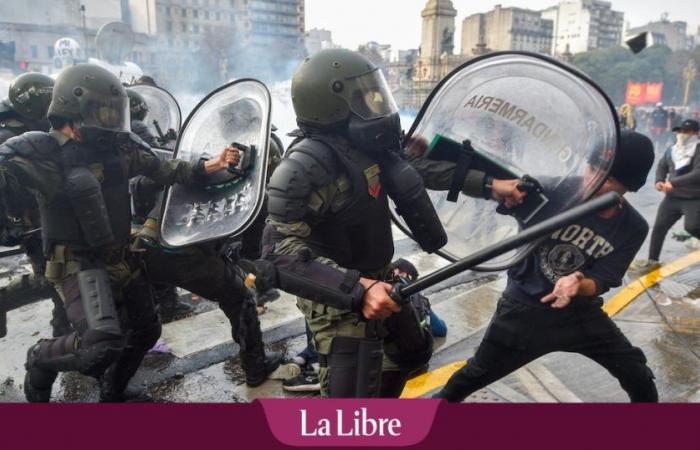As the country sinks deeper into recession and poverty, tensions in the protests are rising. On that day, senators had not yet examined half of the text when the first clashes between protesters and police broke out outside. The police responded to the stone-throwing with batons, tear gas and water cannons.
Thirty-three people were arrested and more than six hundred were injured, according to the count carried out by the Provincial Commission for Memory, the National Committee for the Prevention of Torture (CNPT) and the Evacuation and First Aid Corps (CEPA). ), who have decided to join forces to “monitor” the police since the government put in place the “anti-blockade protocol”.
Despite violent protests, Milei gets Senate approval for reforms: “We are discussing a law that will take us back 100 years”
Criminalized protests
Unveiled on December 12, the “protocol” simply criminalizes demonstrations, making it illegal to block public roads. It also provides that social organizations “pay the bill” for the police force put in place to repress them.
Despite this measure, until now, the tradition so anchored in Argentina of expressing social anger in the streets has held strong, as shown by the very successful demonstrations called by the CGT on January 24, or the march massive protest to defend the university last April.
Unveiled on December 12, the “anti-blockade protocol” simply criminalizes demonstrations, making it illegal to block public roads.
But the degree of violence deployed by the State on June 12, and in particular the wave of arrests, marks an unprecedented repressive turning point. In a press release published on June 24, Amnesty International is particularly concerned about a “chilling effect on freedom of expression”.
Santiago Adano, a 38-year-old musician, shares this concern. “Since the beginning of the Milei era, the protests have not been the same. The protocol has changed everything, it has diluted some of the limits established and accepted during all these years of democracy. Every time you go out (in a demonstration), you risk being arrested […] even if you do nothing”, laments the artist in the pages of Rolling Stones magazine. While he wanted to participate in the June 12 demonstration, Santiago Adano was literally prevented from doing so by the police, who were thrown at him as he was leaving the subway in front of Congress. “They grabbed me among others, and started dragging me and choking me. […] When I told them I felt bad, they grabbed my pants and underwear and stuck them between my buttocks. They behaved with incredible sadism and violence.”
Long list of accusations
The musician was one of thirty-three people arrested. It was only once they were in their cells that they were informed of the long list of crimes they were accused of, including “attacking public safety”, “incitement to commit crimes” and even “terrorism”.
“The prosecutor did not describe any concrete facts […]. He relied on articles which themselves referred to a press release from the presidency,” denounced the Center for Legal and Social Studies (CELS), which filed a complaint with the Inter-American Court of Human Rights. man Indeed, while the repression was rampant, through an official press release on the X platform, the government congratulated the police for having “repressed the terrorist groups which. […] attempted to carry out a coup d’état.”
Second national strike against Javier Milei’s reforms in Argentina: “They live in a parallel world”
The seriousness of the charges contrasts with the profile of the detainees: students, journalists, street vendors and even several people who did not participate in the demonstration. This is the case of Matias Ramirez who sold sausages a stone’s throw from Congress. When the repression broke out, he rushed to his car parked a few meters away and was violently intercepted by the police, who took him to the police station and then to Ezeiza prison.
“They slapped me”
“As soon as we entered, they pushed us against a wall and started spraying us with gas. They stripped us naked and interrogated us. How much did they pay you to go there? And what group are you from? These kinds of questions, one of the members of the group replied that he was only fighting against the approval of the law, and they slapped him. Then they slapped me too,” Matias told the daily. Pagina 12. His testimony echoes that of other people who were also victims of violence during their incarceration.
Of the thirty-three people imprisoned on June 12, seventeen, including musician Santiago Adano, were released after 48 hours. On June 18, eleven others were released. Five are still behind bars at present, awaiting trial. On June 28, the Law of Bases, which they opposed, was definitively adopted.






